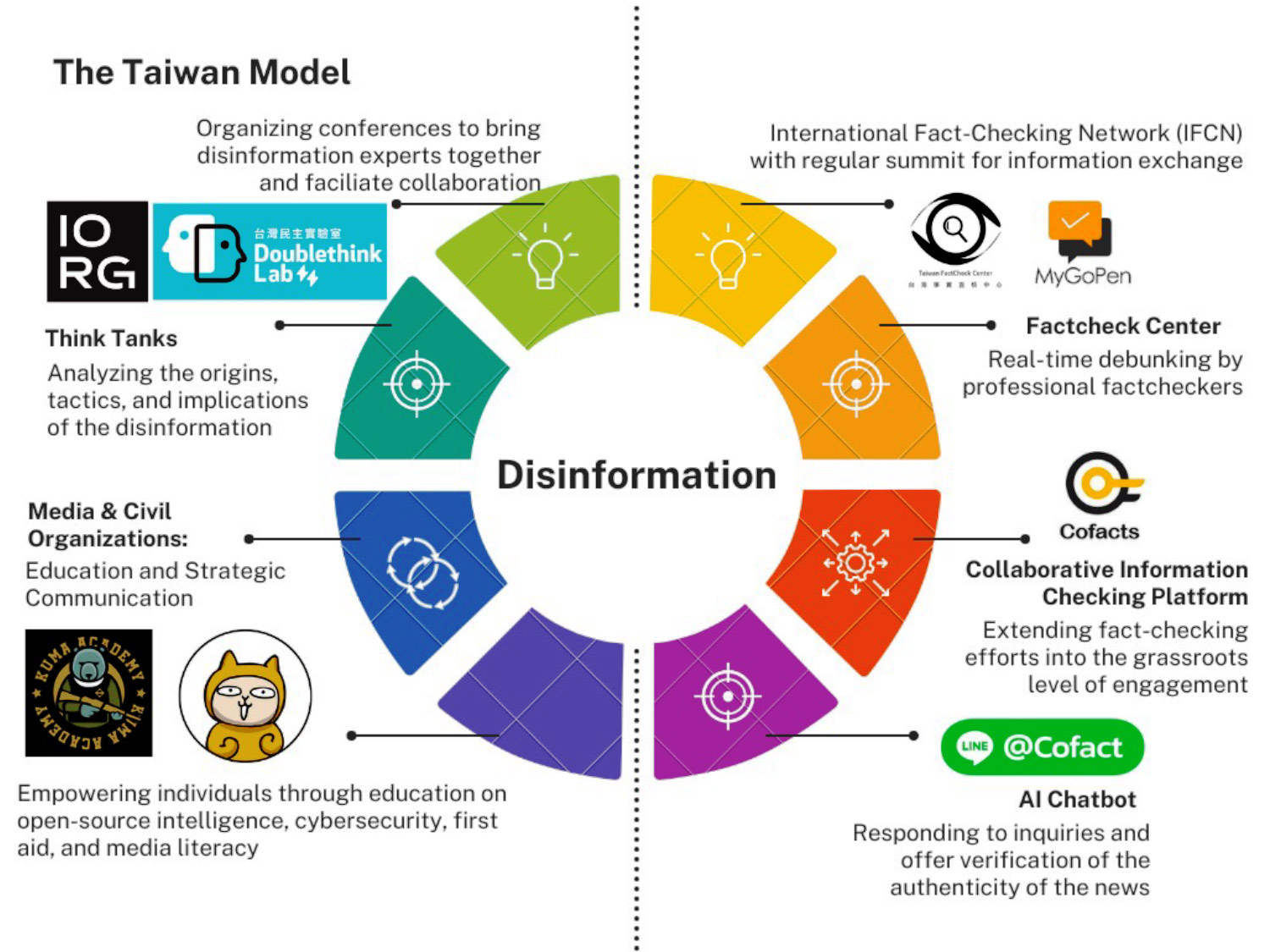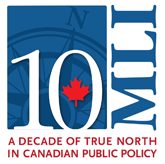Guest Post by Sze-Fung Lee
In the face of decades of aggression and coercion from the People’s Republic of China (PRC), the Taiwanese have formulated a culture of grassroots civic tech engagement. A decentralized social movement community devoted to deepening engagement and connection between groups and citizens, “g0v,” or gov-zero, has successfully fostered numerous civic organizations that not only conduct analysis on Beijing’s influence operation but provide practical operational applications that help defend the island.
Indeed, Taiwan’s decentralized network offers a compelling model from which other nations can learn, especially those interested in combating foreign information manipulation and interference. This paper examines how the Taiwanese community helped counter the PRC influence operation in the past year, including during its latest presidential and legislative election. It explores the island’s decentralized network, analyzes how it and similar entities have formulated a comprehensive approach to strengthen public resilience, evaluates Canada’s situation, and proposes key strategies from which Canada could learn.
Taiwan’s democratic resilience is no coincidence
Although those involved in the decentralized social movement community usually operate on their own initiative, their ability to counter PRC influence operations works like a chain or cycle. Each entity specializes in tackling a part of the disinformation campaign, but together those efforts constitute a comprehensive response that identifies, debunks, and counters disinformation in Taiwanese society.

Figure 1: Taiwan’s decentralized network helps counter disinformation and strengthen public resilience Design: Author
Think tanks provide attribution and analysis
In the realm of information warfare, determining who created the disinformation and what the strategies, tactics, and implications are of the influence operations are fundamental to countering it. Fake news will always exist; completely halting it is simply impossible. Further, fact-checking has been increasingly challenging given the use of rapidly advancing emerging technologies like deepfakes. However, a deep and comprehensive knowledge of the patterns and trends of disinformation – and the tactics used to deploy it – could help those being targeted pre-emptively identify, debunk, and counter disinformation, whether or not its quality and quantity have been improved.
Taiwan’s think tanks, which specialize in investigating information warfare, play a key role in increasing the understanding of these operations among the general populace. Their work provides the background that enables other entities to play their part, such as contributing knowledge for civil education. Without the think tanks’ endeavours, Taiwan would never be able to get ahead of its adversaries to effectively protect the island.
The Taiwan Information Environment Research Center (IORG) and Doublethink Lab are two renowned think tanks on the island dedicated to analyzing the origins and the tactics, techniques, and procedures (TTPs), and the implications of influence operations. These institutions have adopted robust social science methodologies to investigate information manipulation and facilitate policy-oriented research to strengthen democratic resilience against digital authoritarianism.
In the latest presidential and legislative elections in Taiwan, both institutions published reports detailing how foreign bodies manipulated information in an attempt to influence public opinion. Their reports included an analysis of whether the accounts taking part in influence operations originated from the PRC, and the level of their anonymity, authenticity, and coordination (Doublethink Lab 2024), as well as how certain stories and debates affect the Taiwanese people’s support for different parties’ candidates (IORG 2024).
In addition, think tanks also organize regular conferences and roundtables to bring together experts in the field, which helps participants exchange knowledge and potentially collaborate to deal with emerging challenges. For instance, Doublethink Lab organized the China in the World Conference in December 2023 and IORG hosted a Democratic Resilience Forum in January 2024. These gatherings brought together researchers and stakeholders in academia, think tanks, the media, and governments worldwide to discuss the PRC’s global influence and the actions necessary for strengthening liberal resilience.
Fact check centres and chatbots offer real-time debunking
Taiwan’s two independent fact-checking centres – The Taiwan FactCheck Centre and MyGoPen, which are both verified signatories of the International Fact-Checking Network (IFCN) – play a critical role in debunking fake news by producing regular and ad hoc reports. While the PRC conducted one of its largest influence operations against Taipei during the recent election period, these two institutions actively verified false information circulating online, including deepfakes of the man elected to become the next president of Taiwan, Lai Ching-te (Taiwan FactCheck Centre 2023a). They also highlighted a disinformation campaign that distorted the legal framework of Taiwan’s Central Election Commission (MyGoPen 2024) in attempt to discouraging open political discussion and engagement.
In addition to these entities, the collaborative information checking platform Cofacts leverages the power of crowdsourcing and open-source intelligence by extending fact-checking efforts to the grassroots level. Because anyone interested can volunteer to support the initiative, it not only encourages civic engagement, but also shares the overwhelming burden that professional factcheckers carry in the eternal information warfare race.
Real-time debunking has been further enhanced with the development of technological tools and cooperation with social media platforms. Cofacts, for instance, has created a chatbot in LINE that can respond to inquiries and verify the authenticity of the news 24 hours a day (Cofacts Undated). This system leverages instant messaging to gather data on the latest disinformation disseminated. Meanwhile, it also encourages the Taiwanese public to participate in fact-checking via one of the most commonly used communication applications.
Media and civil organizations assist with education and strategic communication
Another key element for ensuring that countermeasures are successful is independent media outlets and civil organizations. They take a more publicfacing approach and communicate the results of the think tank studies with the general public based. Watchout, for example, often produces strategic communications – including civil defence guides (Watchout 2023), podcasts, and other social media content – that help strengthen public awareness and resilience against disinformation. Meanwhile, another civil organization, the Kuma Academy, focuses on empowering individuals by providing education on cyber and operational security, open-source intelligence analysis, and media literacy.
Although these entities lack a robust coordination mechanism, their collective efforts foster a culture of civic engagement focused on countering disinformation and formulating a comprehensive strategy to strengthen democratic resilience as a whole.
Canada has none of these entities
Canada has none of the decentralized social movement community entities that Taiwan does. For instance, no think tank in Canada (perhaps other than DisinfoWatch) focuses specifically on investigating the sources of, and the tactics, techniques, and procedures of malign influence operations. Neither are there any independent fact-checking centres targeting the nation’s Englishlanguage speakers. Whilst three entities accredited by the International FactChecking Network (IFCN) do exist in Canada (IFCN 2024), two of them are Francophone media outlets – Décrypteurs (Radio-Canada) and L’Agence Science-Presse (The Science-Press Agency); the third is Factnameh, a factchecking team that caters to the Persian-speaking community.
Given that English is one of Canada’s official languages and accounts for 75.4 percent of the population (Canada 2019), the absence of a sound, independent, Anglophone fact-checking centre underlines the significant gaps in Canada’s current ability to debunk fake news, let alone combat external influence operations. That absence is despite the fact that disinformation from China, including through Weixin/WeChat, Weibo, and Douyin/TikTok, is one of the most pressing sources of foreign information manipulation and interference in Canada and within Chinese diaspora communities.
Canada clearly lacks a comprehensive structure to address the rising challenges posed by disinformation. However, the Taiwan model gives concrete examples that Canada might wish to follow if it wants to enhance its digital and democratic resilience.
Ten things Canada can learn from Taiwan’s decentralized network
Canada can start filling the gaps in its disinformation response strategy in several ways. It can learn from Taiwan’s decentralized network and incorporate civil organizations, think tanks, tech companies, and government, to leverage several key strategies. Specifically, Canada can:
1. Establish think tanks that are dedicated to analyzing influence operations, akin to Taiwan’s IORG and Doublethink Lab, and set up accredited independent fact-checking centres to debunk fake news. These institutions should produce regular and ad hoc reports that are, at the very least, French/English bilingual;
The Canadian government may consider funding the daily operation of these entities and maintain incentives to ensure it secures talented people to take on this line of work. Because of the rising concern about PRC interference, yet with insufficient research in this field (most disinformation studies in Canada still focus heavily on disinformation from Russia, especially in the public sphere) Ottawa should prioritize funding research in these areas;
2. Organize regular conferences and roundtables to bring disinformation experts in academia, think tanks, media, and government together to exchange knowledge and facilitate potential collaboration. Either facilitated by Ottawa, universities, and/or think tanks, Canada should start having annual conferences on disinformation and foreign influence sooner rather than later.
As researchers and stakeholders in the field are scattered across Canada, these conferences should be held not only in Ottawa but in other cities across the country. Toronto, for instance, would be an ideal place;
3. Organize “hackathons” to promote a culture of grassroots social engagement. As mentioned above, the civic community g0v fosters activism and collaboration among like-minded individuals. Many of Taiwan’s well-known civil organizations were initiated by joint projects during g0v’s hackathons. Regular hosting of these would enable stakeholders to gather and cooperate on projects that would help strengthen public resilience in Canada;
4. Use the power of crowdsourcing and open source intelligence to design a collaborative platform where ordinary citizens can participate in fact-checking (similar to Taiwan’s Cofacts). If successfully established, such an initiative may be particularly effective in Chinese-speaking communities since it could leverage the diaspora’s linguistic ability and cultural sensitivity to identify and combat influence operations, including the PRC’s evolving tactics, techniques, and procedures, and its intensifying transnational repression;
5. Facilitate cooperation between civil organizations, universities, social media platforms, and tech companies to develop technological solutions to tackle disinformation, such as fact-checking chatbots to debunk disinformation in real time (akin to Cofacts’ LINE chatbot) – potentially in multiple languages;
6. Work with social media platforms to label state-affiliated entities and establish a robust system for civil society to report suspicious activities, including spamouflage and other coordinated inauthentic behaviour. Ottawa should consider pressuring social media companies to provide more data access for researchers to conduct analysis;
7. Foster better strategic communication to educate and inform the public about the occurrence, ramifications, and countermeasures of the most recent influence operations. While media outlets could devote more resources to producing strategic communication, the Canadian government should also take the lead on this. To date, Ottawa has only published several strategic communications documents on the Russian invasion of Ukraine, along with some general toolkits aimed at protecting democracy (Canada 2024). There are none on the PRC’s influence operation, despite the aggregating challenges it poses to Canada’s liberal democracy;
8. Organize more delegations to Taiwan to learn from their experience in dealing with foreign information manipulation and interference. The trip to the island of a multi-party delegation of Canadian politicians in April 2023 (Paas-Lang 2023) exemplifies the type of exchange we should be seeing more of. Furthermore, the recent Taiwan election observation delegation shows that such visits do not have to be limited to politicians and policymakers, but can also include researchers and journalists, and could be normalized so society worldwide can draw insights from Taipei’s profound experience;
9. Introduce laws and regulations to increase transparency and criminalize the use of artificial intelligence in disinformation, such as harmful deepfakes. Currently, Canada has no bills that specially address the malicious use of deepfakes, other than the new Intimate Images Protection Act in British Columbia (Schmunk 2024). The recently proposed No AI FRAUD Act in the United States may be a good reference for Canada for establishing a federal framework to protect against AI abuse. Taiwan’s Election and Recall Act also added specific clauses to prevent deepfake audio and video from influencing elections (Taiwan FactCheck Centre 2023b), which could also provide relevant examples for lawmakers to consider; and
10. Release to the public more of the existing internal reports about the influence operations being deployed by malign actors. Whilst there are units and departments within the Canadian government that do excellent research on PRC disinformation, such as the investigation by Rapid Response Mechanism Canada on the spamouflage campaign targeting Members of Parliament that was linked back to the PRC (Rapid Response Mechanism Canada 2023), reports are seldom made public, even when they don’t involve sensitive or classified materials.
Making more of these open-source analyses available to the public helps bolster democratic resilience by fostering better communication (public diplomacy) and understanding of the subject. Making them public also strengthens Canada’s accountability on its committment to defend its people against totalitarianism while deterring Beijing’s aggression via concrete attribution (name and shame).
Where the future lies
Despite being easier said than done, a whole-of-society approach is not a slogan but a practical strategy that helps build democratic resilience. In its response to disinformation and foreign interference, Canada is already ten steps behind many other like-minded nations. As the world confronts the evolving landscape of cognitive warfare, it is imperative that Canada – sooner rather than later – take concrete actions to combat foreign influence campaigns.
About the author
Sze-Fung Lee (ze/zir) is an independent researcher specializing in Chinese hybrid warfare, including foreign information manipulation and interference (FIMI), grand strategy, nuclear proliferation, gray zone tactics, and cognitive warfare. Zir research also focuses on IndoPacific security policy, challenges posed by emerging technologies, and the politics of Hong Kong.
Zir work has been featured in international media, such as the Diplomat, Modern Diplomacy, Eurasia Review, the Hill Times, Policy Option, and Hong Kong Economic Journal.
Previously, ze was an analyst at the Centre for International Digital Policy, Global Affairs Canada (Ministry of Foreign Affairs) from 2022 to 2023. Ze also holds a Master’s Degree in International Security from the University of Warwick.
Find ze on X/Twitter: @imleeszefung
References
Canada. 2019. Statistics on Official Languages in Canada. Government of Canada. Available at https://www.canada.ca/en/canadian-heritage/services/ official-languages-bilingualism/publications/statistics.html.
Canada. 2024. “Protecting Canada’s Democratic Institutions.” Government of Canada. Available at https://www.canada.ca/en/democratic-institutions/ services/protecting-democratic-institutions.html Cofacts. Undated. “What is Cofacts?”
Cofacts. Available at https://en.cofacts. tw/about. Doublethink Lab. 2024. “2024 Taiwan Election: Preliminary Analysis of the Foreign Information Manipulation Impact Observation.” [Author’s translation. Original in Chinese.] Medium (January 18). Available at https:// medium.com/doublethinklab-tw/2024-%E5%8F%B0%E7%81%A3%E9 %81%B8%E8%88%89-%E5%A2%83%E5%A4%96%E8%B3%87%E8% A8%8A%E5%BD%B1%E9%9F%BF%E8%A7%80%E6%B8%AC%E5% A0%B1%E5%91%8A%E5%88%9D%E6%AD%A5%E5%88%86%E6% 9E%90-fe7f819aeabd.
g0v [gov-zero]. Undated. Home page. g0v. Available at https://g0v.tw/intl/en/.
International Fact-Checking Network [IFCN]. 2024. “Verified Signatories of the IFCN Code of Principles.” IFCN. Available at https://ifcncodeofprinciples. poynter.org/signatories.
MyGoPen. 2024. “We’ll Be Fined $500,000 for Supporting Anyone or Polling at a Few Percent Starting from Today. Don’t Spread the Polls! No Electioneering on Voting Day.” [Author’s translation. Original in Chinese.] MyGoPen (January 3). Available at https://www.mygopen.com/2024/01/500k.html
Paas-Lang, Christian. 2023. “Grappling with Foreign Interference Allegations at Home, MPs Look to Taiwan for Ideas.” CBC News (April 16). Available at https://www.cbc.ca/news/politics/taiwan-mps-visit-1.6811974.
Rapid Response Mechanism Canada. 2023. “Probable PRC ‘Spamouflage’ Campaign Targets Dozens of Canadian Members of Parliament in Disinformation Campaign.” Government of Canada. Available at: https://www. international.gc.ca/transparency-transparence/rapid-response-mechanismmecanisme-reponse-rapide/2023-spamouflage.aspx?lang=eng.
Schmunk, Rhianna. 2024. “Explicit Fake Images of Taylor Swift Prove Laws Haven’t Kept Pace with Tech, Experts Say.” CBC News (January 26). Available at https://www.cbc.ca/news/canada/ taylor-swift-ai-images-highlight-need-for-better-legislation-1.7096094.
Taiwan FactCheck Centre. 2023a. “Lai Ching-Te Says KMT-TPP is the Right Coalition. AI-Generated Video Appears in Taiwan’s Presidential Election Campaign.” [Author’s translation. Original in Chinese.] Taiwan FactCheck Centre (November 29). Available at https://tfc-taiwan.org.tw/articles/9949.
Taiwan FactCheck Centre. 2023b. “2024 Election Checker Notes Episode 1: Taiwan’s First Pre-Election AI Fake Audio – Steps to Identify Edited Videos.” Taiwan FactCheck Centre. [Author’s translation. Original in Chinese.] Available at: https://tfc-taiwan.org.tw/articles/9781.
Taiwan Information Environment Research Centre [IORG]. 2024. “2023 Overall Research Findings – 2024 Election.” [Author’s translation. Original in Chinese.] IORG. Available at https://iorg.tw/_ua/r/2023#h2-2.
Watchout. 2023. Taiwan Civil Defense Guide – When the War Comes. [Author’s translation. Original in Chinese.] Watchout. Available at https://watchout.tw/ projects/civilguide/.
This report was originally posted to the Macdonald-Laurier website.


